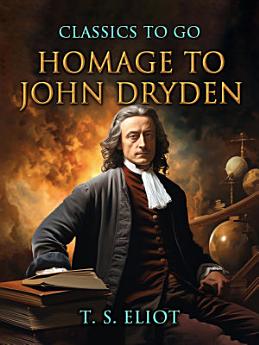Homage to John Dryden
feb 2024 · Otbebookpublishing
Libro electrónico
35
Páginas
family_home
Apto
info
reportLas calificaciones y opiniones no están verificadas. Más información
Acerca de este libro electrónico
Excerpt: "The three essays composing this small book were written several years ago for publication in the "Times Literary Supplement," to the editor of which I owe the encouragement to write them, and now the permission to reprint them. Inadequate as periodical criticism, they need still more justification in a book. Some apology, therefore, is required. My intention had been to write a series of papers on the poetry of the seventeenth and eighteenth centuries: beginning with Chapman and Donne, and ending with Johnson. This forbidden fruit of impossible leisure might have filled two volumes. At best, it would not have pretended to completeness; the subjects would have been restricted by my own ignorance and caprice, but the series would have included Aurelian Townshend and Bishop King, and the authors of "Cooper's Hill" and "The Vanity of Human Wishes," as well as Swift and Pope. That which dissipation interrupts, the infirmities of age come to terminate. One learns to conduct one's life with greater economy: I have abandoned this design in the pursuit of other policies. I have long felt that the poetry of the seventeenth and eighteenth centuries, even much of that of inferior inspiration, possesses an elegance and a dignity absent from the popular and pretentious verse of the Romantic Poets and their successors. To have urged this claim persuasively would have led me indirectly into considerations of politics, education, and theology which I no longer care to approach in this way. I hope that these three papers may in spite of and partly because of their defects preserve in cryptogram certain notions which, if expressed directly, would be destined to immediate obloquy, followed by perpetual oblivion."
Acerca del autor
Thomas Stearns Eliot, known as T. S. Eliot, was a towering figure in 20th-century literature, born on September 26, 1888, in St. Louis, Missouri. Eliot's journey from the American Midwest to the heart of British literary society is as compelling as his work. Educated at Harvard, the Sorbonne, and Merton College, Oxford, Eliot's academic rigor laid the foundation for his profound contributions to modernist poetry and literary criticism.Eliot's early work, including "The Love Song of J. Alfred Prufrock" and "The Waste Land," revolutionized poetry with their fragmented structure, mythic allusions, and exploration of modern despair. His innovative use of language and form challenged traditional poetic norms and influenced contemporaries and successors alike, including Ezra Pound, who played a crucial role in editing "The Waste Land."Controversially, Eliot's works and personal views have sparked debates. His conversion to Anglicanism and British citizenship in 1927, along with his conservative social and political views, contrasted sharply with the progressive currents of his time. Additionally, his anti-Semitic remarks and themes have been subjects of critical scrutiny, complicating his legacy.Eliot's influence extends beyond poetry; his plays, such as "Murder in the Cathedral" and "The Cocktail Party," and his critical essays have left an indelible mark on literary theory and drama. Awarded the Nobel Prize in Literature in 1948, Eliot's legacy is one of profound intellectual and artistic impact, continuing to provoke and inspire modern readers and writers. His exploration of existential angst, spiritual desolation, and the search for meaning resonates deeply in today's fragmented world, ensuring his place as a seminal figure in literary history.
Califica este libro electrónico
Cuéntanos lo que piensas.
Información de lectura
Smartphones y tablets
Instala la app de Google Play Libros para Android y iPad/iPhone. Como se sincroniza de manera automática con tu cuenta, te permite leer en línea o sin conexión en cualquier lugar.
Laptops y computadoras
Para escuchar audiolibros adquiridos en Google Play, usa el navegador web de tu computadora.
Lectores electrónicos y otros dispositivos
Para leer en dispositivos de tinta electrónica, como los lectores de libros electrónicos Kobo, deberás descargar un archivo y transferirlo a tu dispositivo. Sigue las instrucciones detalladas que aparecen en el Centro de ayuda para transferir los archivos a lectores de libros electrónicos compatibles.






